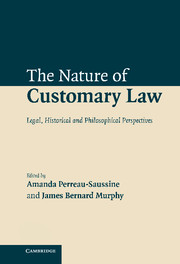The character of customary law: an introduction
Published online by Cambridge University Press: 30 June 2009
Summary
A book on customary law, many modern lawyers might say, can have no relevance for them. And neither, many modern thinkers would echo, could it be of much interest. On many influential modern accounts, reliance on customary practices is a mark of inadequacy: acceptance of customs should be minimal and provisional since an unreflective attachment to customary ways of thinking is inimical both to practical thought and to political harmony. Modern societies and their legal systems depend not on enslavement to customary habits and laws but on reasoned principles and doctrines; customary laws grow up only where legislators have done a particularly poor job, leaving a need for elaborate statutory construction and legislative gap-filling. The more coherent and consistent a legal system, the less the need for such customary rules and practices: an interest in customary law reflects at worst what Jeremy Bentham called the ‘sinister’ interests of self-interested reactionaries, and at best the eccentric tastes of scholars, antiquarians and those purporting to be international lawyers who work in what, on such accounts, is really a lawless international world.
This brief chapter introduces the diverse views of customary law offered in this collection of essays, showing how, despite this diversity, the thirteen contributors are united in arguing that such rejections of the relevance of customary law are wrong.
- Type
- Chapter
- Information
- The Nature of Customary LawLegal, Historical and Philosophical Perspectives, pp. 1 - 10Publisher: Cambridge University PressPrint publication year: 2007
- 11
- Cited by

